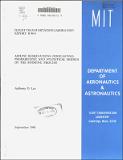Airline reservations forecasting : probabilistic and statistical models of the booking process
Author(s)
Lee, Anthony Owen
DownloadFTL_R_1990_05.pdf (11.52Mb)
Alternative title
Probabilistic and statistical models of the booking process
Other Contributors
Massachusetts Institute of Technology. Flight Transportation Laboratory
Metadata
Show full item recordAbstract
In this thesis, we develop the necessary statistical framework to produce accurate forecasts of total bookings in a particular fare class on a specific flight number departing on a given date at various points before departure. After an introduction to the basic terminology of the airline booking process, a rigorous probabilistic model is developed. The booking process is modeled as a stochastic process with requests, reservations, and cancellations interspersed in the time before a flight departs. The key result of the probabilistic analysis is a censored Poisson model of the airline booking process. A comprehensive statistical framework views the booking process from a data analysis perspective. We describe models based on advance bookings (the traditional booking curve) and historical bookings (a traditional time series model). An important development is the combined model which features a potentially more accurate combination of the advance bookings and historical bookings models. Additionally, we extend the statistical framework to include booking limits, which constrain the observed number of reservations in each fare class. The result is a truncated-censored regression model with truncation from below at zero and censoring from above at the booking limit. We test the forecasting ability of the censored Poisson model and a combined statistical model with censored Normal errors using actual airline data provided by a major U.S. airline. When compared to industry standard models, the models developed in this thesis produce significant improvements in forecast accuracy. In the appendix, a Monte Carlo simulation is performed to determine the value of accurate forecasting for the airlines. The results demonstrate that each 10% improvement in forecast accuracy can bring about a 0.5% to 3.0% increase in expected revenues.
Description
September 1990 Includes bibliographical references (p. 232-236)
Date issued
1990Publisher
Cambridge, Mass. : Flight Transportation Laboratory, Dept. of Aeronautics and Astronautics, Massachusetts Institute of Technology, [1990]
Other identifiers
23735354
Series/Report no.
FTL report (Massachusetts Institute of Technology. Flight Transportation Laboratory) ; R90-5
Keywords
Airlines, Air travel, Reservation systems, Mathematical models, Forecasting